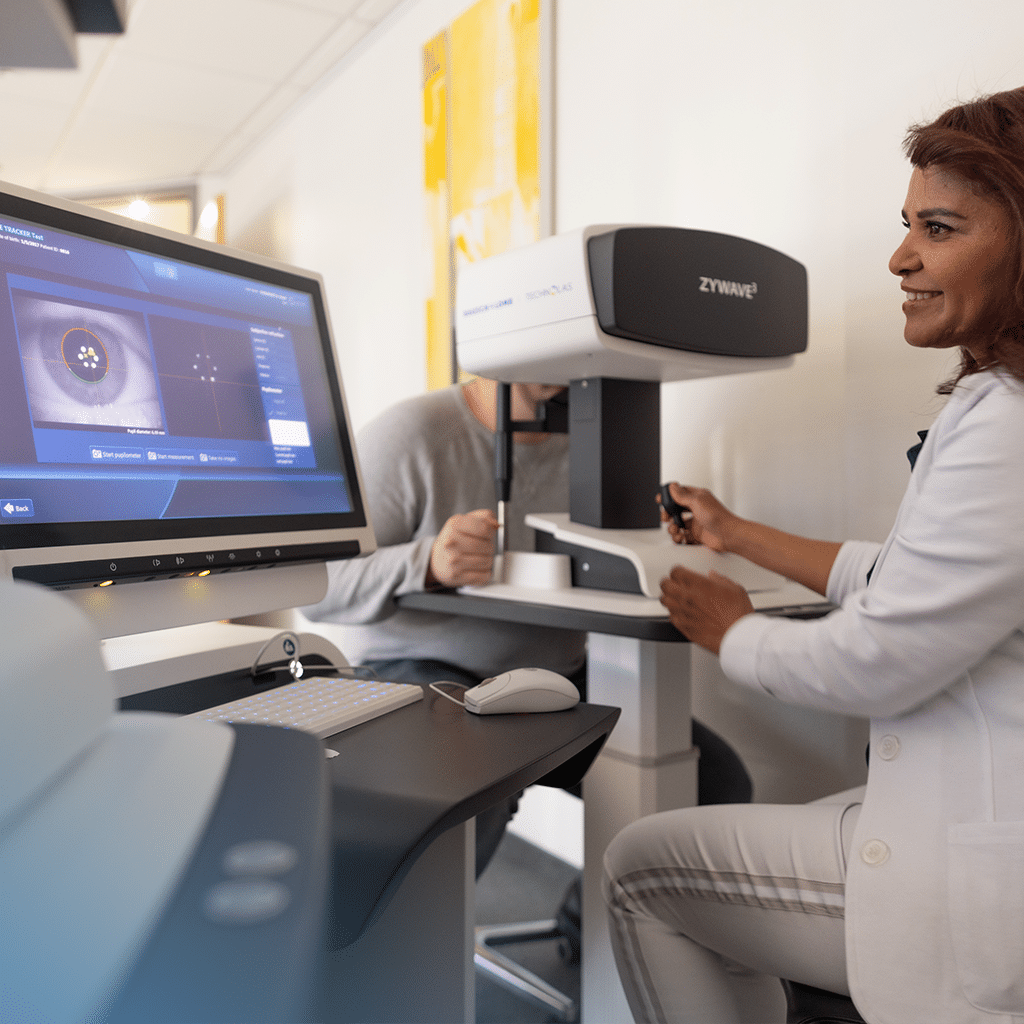Femto-LASIK: Painless and precise
As an experienced chief physician at the LaserZentrum Wiesbaden and expert in Femto-LASIK, Beate Steinhorst will be happy to advise you comprehensively on this topic.
Femto-LASIK the gold standard
Short operation time of only 60 seconds
Highest precision thanks to femtosecond laser
Uniform and thinner corneal flaps
Further development of the LASIK method
Femto-LASIK at LZW: highly precise, painless, gentle
The LZW primarily uses Femto-LASIK, a further development of classic LASIK. In Femto-LASIK, a femtosecond laser prepares the flap extremely precisely as a uniform corneal lamella without any mechanical influence.
The advantages of this laser method: extremely precise, bladeless, painless, risk-free and also suitable for the treatment of difficult corneas.

How does Femto-LASIK work?
Step 1: Preparation of flap with the femto laser
In the first step, a thin flap is prepared in the top layer of the cornea. The femto laser is used for this. It sends ultra-short laser pulses under the surface of the cornea. The result is a flap that is precisely shaped to within a hundredth of a millimeter. The flap is folded to the side - the eye is ready for LASIK.
Step 2: First flap, then LASIK
Once the flap is prepared, the actual LASIK procedure takes place. Regardless of whether it is femto- or classic LASIK, a few thousandths of a millimeter of corneal tissue is removed using an excimer laser. The cornea is modeled and the visual impairment is corrected. After the operation, the flap is folded back again. It adheres by itself and protects the wound like the body's own plaster. The procedure is almost painless.
Step 3: LASIK – correction of the cornea with the excimer laser
Now the curvature of the cornea is changed according to the individual diagnosis. The correction only takes a few seconds. Then the treated area is covered again with the flap. This protects the eye like a plaster and grows back in a short time.
Femto-LASIK: The Future of Vision Correction
Femto-LASIK is considered the gold standard in refractive eye surgery and is known for its exceptional precision in correcting refractive errors such as nearsightedness, farsightedness and astigmatism. This method enables a correction accuracy of up to 1/100 diopter. This method combines the advantages of LASIK with the advanced technology of the femtosecond laser, which enables a tailor-made, precise treatment for each individual eye.
As an experienced chief physician at the LZW and expert in Femto-LASIK, Beate Steinhorst will be happy to advise you comprehensively on this topic.
Fragen zur Methode? 0611 – 360 220

Benefits of Femto-LASIK and Risks of ReLEx SMILE
Femto-LASIK is the further development of classic LASIK; the additional femtosecond laser prepares the required flap extremely precisely and without risk, without the use of a scalpel. As the gold standard in refractive surgery, Femto-LASIK offers new advantages over LASIK, such as being painless, even more precise and suitable for individual eyes.
Innovative technologies that enable precise vision correction allow you to fully enjoy your leisure activities such as reading, traveling and sports. These lenses are designed to follow the natural movements of the eye and offer a customized solution for your vision needs.
Femto-LASIK
- practically painless
- extremely precise
- blade-free and risk-free
- Possibility of subsequent correction using the same procedure
- Solution for a variety of visual impairments, even at higher values
- Personalized stray lights (aberrations) can be corrected with
ReLEx SMILE
- Complications during lenticule removal can lead to significant distortions of the corneal surface.
- Achieving optimal visual acuity may take more time than with LASIK.
- A subsequent correction using the same procedure is not possible. It can then only be treated with LASIK, Femto-LASIK or PRK.
- Head movements or pinching by the patient can cause a loss of pressure, which can lead to the procedure having to be aborted and not being able to be continued/repeated in this way.
- The costs for laser eye surgery with SMILE are considerably higher than for LASIK and Femto-LASIK.
- The process is still relatively new,
- Long-term experience is only limited.
- Aberrations cannot be corrected.
- Farsightedness cannot be treated with this method.

